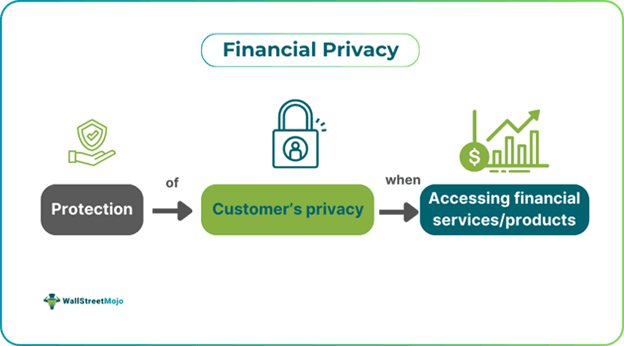Table of Contents
What Is Financial Privacy?
Financial Privacy refers to the protection of customers' personal information when accessing financial services from any institution. The sole purpose of this privacy rule is to safeguard customers' sensitive and valuable information, which usually stays with financial institutions like banks and credit unions.

Many customers are reluctant to use online channels for purchases, given the digital transformation surfacing in the finance realm. This predicts higher chances for cyberattacks, and the customer's personal information is at stake. However, financial organizations and government agencies have introduced financial privacy laws and acts to protect the customer's interests.
Key Takeaways
- Financial privacy is the term used to describe the protection of customer's data when purchasing products or services from financial institutions. These institutions include banks, credit unions, lenders, savings and loans, and credit card companies.
- Any misuse of this information can lead to potential fraud on the bank's part.
- Customers can avoid the misuse by choosing to opt out of information sharing, which prevents details from being used or shared with third-party clients.
- Some of the privacy laws that govern this aspect include the Right to Financial Privacy Act (RFPA), the General Data Protection Regulation (GDPR), the Gramm-Leach-Bliley Act (GLBA), and more.
Financial Privacy Explained
Financial privacy is the protection of the person's sensitive and confidential information while using financial services from banks and other financial institutions, including credit unions, insurance agencies, and securities firms. It tries to shield an individual's details (like identity and account number), which can be easily leaked to the public. So, if a person has taken a loan from a lender, the latter cannot use that information for its benefit. Moreover, as per the financial privacy rule, any financial institution holds no right to tamper with the information given by customers for registration or verification purposes. This law is followed by many countries and organizations operating worldwide.
Financial institutions (like banks) collect information from their customers for required documentation. However, they tend to exceed their legitimate limits and use the information to assist governments and companies in building their profiles. This can potentially hamper the customer's privacy. Likewise, governments may extract this information for administrative purposes like taxes, anti-money laundering cases, statistics counts, and developing credit profiles.
The major threat arises when hackers track and monitor foreign transactions. They watch the movement of cash transactions and potentially snatch funds from customers. Various financial privacy laws have been established to combat these issues. They regulate financial institutions and their use of data about customers' financial needs. Some of these regulations include the 1978 Right to Financial Privacy Act (RFPA), the General Data Protection Regulation (GDPR), the Gramm-Leach-Bliley Act (GLBA), and the California Consumer Privacy Act (CCPA).
Financial Privacy Rights
As a customer, there are certain privacy rules, rights, and regulations established by the regulatory bodies. Some of the common ones are listed below:
- Consumers can limit the use of their personal information by banks (and other financial companies). This applies to banks, credit unions, savings and loans, credit card companies, and other financial service providers.
- To use or share such information with outside companies, financial institutions must get permission from existing customers.
- Individuals can opt out of this act and prohibit any further sale of information. If a customer does not communicate on information sharing, the financial institution may continue sharing their details with others.
- It is never too late to opt out of this situation. The rules still allow individuals the right to move out even after 45 days from receiving privacy notices.
- The federal laws pertaining to financial privacy rules instruct financial institutions to inform customers of their privacy rights every year.
- If their privacy rights are violated, customers can contact the authorities regulating financial companies and register a complaint with them.
Examples
Let us look at examples of how customers can utilize their financial privacy rights for security needs:
Example #1
Suppose John has opened a bank account with Sinait Bank Ltd. As a complementary offer, he received a credit card and a debit card for his future spending needs. For a few months, John was enjoying the luxury benefits of the card, but things started to mess up after that. He started receiving multiple calls from hackers on the amount of theft and real estate property dealers. Out of frustration, John called the bank and instructed them not to use his information or sell it to any other company. Since then, he has not received those calls ever again.
Example #2
According to news published in November 2024, the Consumer Financial Protection Bureau (CFPB) delivered a report that details the financial privacy protection rights of customers at the federal and state levels. In the report, the CFPB mentioned that big companies are rigorously harnessing the customers' sensitive data for their use, thereby urging the states to fill these loopholes and cater to the customer's interests while also reconsidering whether they should include exemptions from the Gramm-Leach-Bliley Act (GLBA) or the Fair Credit Reporting Act (FCRA).
Importance
Privacy plays a pivotal role in every individual's life, especially when they are dealing with financial service companies and institutions, like banks, given the possibility of them staking the customer's personal information that, if used otherwise, can lead to cyberattacks. Such privacy protects one's identity from potential theft that can have severe consequences on that individual. Likewise, this privacy can shield the assets and funds associated with that financial institution.
Even though laws like the Right to Financial Privacy Act (RFPA) govern such areas, customers must read and understand the terms and conditions of the services purchased. If in doubt, opting out of information sharing can help customers limit the use of sensitive information by unauthorized and unwanted external sources.
